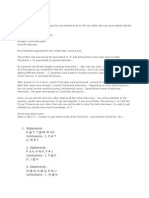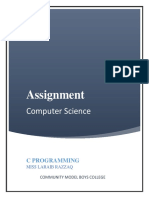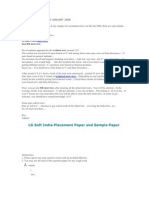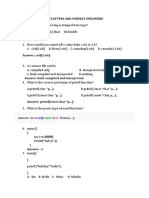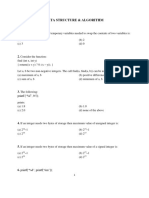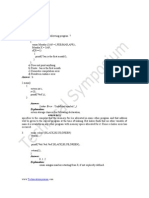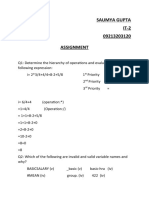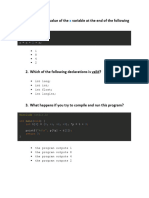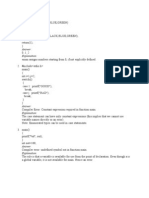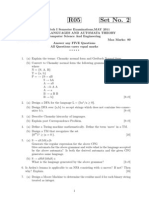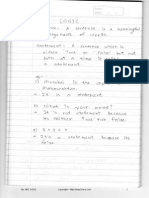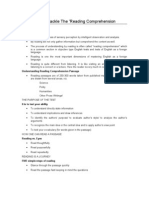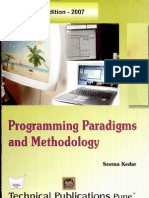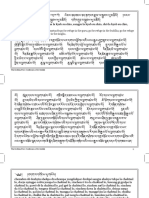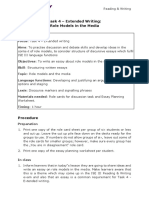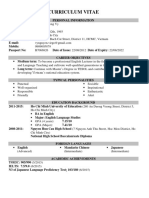C Programming
1. main( )
{
int x = 10, y = 20;/.
x =!x;
y =!x&&!y;
printf(x =%d y =%d, x, y);
}
a) x = 10
b) x = 0
y = 20
y=0
c) x = 20
y = 10
d) None
2. main( )
{
int x = 5;
x++;
printf(x =%d\n, x);
++x;
printf(x = %d\n, x);
}
a) x = 5
b) x = 6
c) x = 7
x=7
x=7
x=5
3. main( )
{
int x = 10, y =x, z =x;
y = x;
z = -x;
t = - x;
printf(y =%d z=%d t=%d, y, z, t);
}
a) y = -10
b) y = 0
c) y = 0
z=0
z = -10
z = -10
t = -10
t = -10
t = -10
4. main( )
{
int i;
for(i = - 1; i < = 10 ; i + +)
{
if ( i < 5 )
continue ;
else
break;
printf(Gets printed only once!!);
}}
a) No output b) Gets printed only once
c)Error
d) None
d) None
d) None
�5. main( )
{
int i =135, a =135, k;
k =function(!++i, !a++);
printf(i =%d a=%d k=%d, i, a, k);
}
function(j, b)
int j, b;
{
int c;
c = j + b;
return( c );
}
a)
i = 136
a = 135
k=0
b) i = 136
a = 136
k=0
c) i = 135
d)None
a = 136
k=0
6. main( )
{
int k = 35, z;
z = func(k);
printf(z =%d, z);
}
func(m)
int m;
{
+ +m;
return(m = func1 (++m));
}
func1(m)
int m;
{
m ++;
return(m);
}
a) z = 38
b) z = 36
None
7. main( )
{
if(printf(C for yourself how it works\n))
main( );
}
c) z = 37
d)
�a)error
d) None
b) C for yourself it works
c) C for yourself how it works
C for yourself how it works
C for yourself how it works
C for yourself how it works
.. . .. .
.
8. main( )
{
int i = 1;
if(!i )
printf(Recursive calls are real pain!);
else
{
i = 0;
printf(Recursive calls are challenging\n);
main( );
}
}
a)Recursive calls are challenging
b) Recursive calls are challenging
c) Error
d) None
Recursive calls are challenging
Recursive calls are challenging .
.. ..
.
9. int i = 0;
main( )
{
printf(in main i =%d\n, i);
i ++;
val( );
printf(in main i =%d\n, i);
}
val( )
{
int i = 100;
printf(in val i = %d\n, i);
i ++;
}
a) 101 1
10. #define NO
#define YES
main( )
{
int i = 5, j;
b) Error message
c)1 100
d) None
�if( i > 5)
j = YES;
else
j = NO;
printf(%d, j);
}
a) Yes Yes Yes Yes Yes Yes b) Error Message c) None
d ) No No No
11. #define AND &&
#define OR ||
#define LE <=
#define GE >=
main( )
{
char ch = D;
if((ch GE 65 AND ch LE 90) OR (ch GE 97 AND ch LE 122))
printf(Alphabet);
else
printf(Not an alphabet);
}
a) No Alphabet
b) Alphabet
c) error
d)None
12. main( )
{
int n[25];
n[0] = 100;
n[24] = 200;
printf(%d %d, *n, *(n + 24) + *(n + 0));
}
a) 200
100 b) 100
300 c) 100
200
d) None
13. main( )
{
int arr[ ] = { 0, 1, 2, 3, 4};
int i, *ptr;
for(ptr = arr + 4; ptr = arr; ptr--)
printf(%d, *ptr);
}
a) 0 1 2 3 4 b) 4 3 2 1 0 c) 1 2 3 4 0 d)None
main( )
14.
{
static char s[ ] = Rendezvours!;
printf(%d, *(s + strlen(s)));
�}
a) 0
b) 1
15.
main( )
c) e
d) None
{
static char str[ ] = { 48, 48, 48, 48, 48, 48, 48, 48, 48, 48};
char *s;
int i;
s = str;
for(i = 0; i <=9; i++)
{
if(*s)
printf(%c, *s);
s++;
}
}
a)0 0 0 0 0 0 0 0 0 0 b) 1 1 1 1 1 1 1 1 1 1 c) 48 48 48 48 48 48 48 48 48 48 d) None
main( )
16.
{
struct employee
{
char name[25];
int age;
float bs;
};
struct employee e;
e.name = Hacker;
e.age = 25;
printf(%s%d, e.name, e.age);
}
a) Hacker, 25 b) Error message
17. main( )
{
struct s1
{
char*str;
int i;
struct s1*ptr;
};
static struct s1 a[ ] ={
c) 25 Hacker d) None
�{Nagpur, 1, a + 1},
{Raipur, 2, a + 2},
{Kanpur, 3, a}
};
struct s1*p = a;
int j;
for (j = 0; j <=2; j++)
{
printf(%d, --a[j].i);
printf(%s\n, ++a[j].str);
}
}
a) 1 aipur
0 agpur
2
anpur
18.
b) 0
1
2
agpur
aipur
anpur
#define NULL 0
main( )
{
struct node
{
struct node *previous;
int data;
struct node *next;
};
struct node *p, *q;
p = malloc(sizeof(struct node));
q = malloc(sizeof (struct node));
p->data = 75;
q->data = 90;
p->previous = NULL;
p->next = q;
q->previous = p;
q->next = NULL;
while(p!=NULL)
{
printf(%d\n, p->data);
p =p->next;
}
}
c) 0
1
aipur d) None
agpur
2
anpur
�a) 90
75
b) 75 c) 90 d) None
90
90
19. main( )
{
struct a
{
int i;
int j;
};
struct b
{
char x;
char y[3];
};
union c
{
struct a aa;
struct b bb;
};
union c u;
u.aa.i = 512;
u.aa.j = 512;
printf(%d%d, u.bb.x, u.bb.y[0]);
printf(%d%d, u.bb.y[1], u.bb.y[2]);
}
a)2020
b) 0022
c) 0202
d) None
20. main( )
{
int a = 3, b = 2, c =1, d;
d = a| b & c;
printf(d = %d\n, d);
d = a| b & ~ c;
printf(d =%d\n, d);
}
a)
d=2
d=2
b) d = 3
d=3
c) d = 1
d=1
d) None
�21. main( )
{
static char a[]=Bombay;
char *b=Bombay;
printf(%d %d,sizeof(a),sizeof(b));
}
a. 1 6
b. 1 1
c. 6 6
d. None
22. main( )
{
int i=3;
i=i++;
printf(%d,i));
}
a. 3
b. 4
d. Error
c. undefined
23. What error would the following function give on compilation.
f (int a,int b)
{
int a;
a=20;
return a;
}
a. Missing parantheses in return statement.
b. The function should be defined as
int f(int a,int b)
c. Redeclaration of a.
d. None of the above.
24. main( )
{
int b;
b=f(20);
printf(%d,b);
}
int f(int a)
{
a>20?return (10):return (20);
}
a. 20
b. 10
25. #define sqr(x) (x*x)
main( )
c. No output
d. Error
�{
int a,b=3;
a=sqr(b+2);
printf(%d,a);
}
a. 25
b. 11
c. Error
d. Garbage value
26 #define str(x) #x
#define Xstr(x) str(x)
#define oper multiply
main( )
{
char *opername=Xstr(oper);
printf(%s,opername);
}
a. oper
b. multiply
c. Error
d. None
27. main( )
{
printf(%c,7[sundaram]);
}
a. S
b. m
c. \0
d. Error
28. main( )
{
int a[ ]={10,20,30,40,50};
char *p;
p=(char *)a;
printf(%d,*((int *)p+4));
}
a. 50
b. 10
c. Error
d. None
29. main( )
{
printf(%c,abcdefgh[4]);
}
a. a
b. e
c. Error
d. None
30. main( )
{
printf(%d %d %d,sizeof(3),sizeof(3),sizeof(3));
}
a. 1 1 1
b. 2 2 2
c. 1 2 2d. 1 1 1
Note: Assume size of int is 2 bytes.
31. main( )
{
struct emp{
�char n[20];
int age;}
struct emp e1={david,23};
struct emp e2=e1;
if(e1= = e2) printf(structures are equal);
a.
b.
c.
d.
}
structures are equal
No output
Error
None
32. main( )
{
char a[ ];
a[0] = A;
printf(%c, a[0]);
}
a) Compilation Error
b) No output
c) A
d) None
33. main( )
{
char **p =Hello;
printf(%s, **p);
}
a) Hello b) **p c) Error
d) None
34. main( )
{
int count, end=20;
for (count=1; count<=end; count++)
{
if(count %2) continue;
else
if(count %4) continue;
else
if(count %6) continue;
else
if(count %8) continue;
else
if(count %10) continue;
else
if(count %12) continue;
else
printf(%d, count); }
�printf(%d, count);
}
The output is
a)No display
b) Error c) 20 21 d) 21
35. main( )
{
int a=5;
do
{
printf(%d\n, a);
a = -1;
} while (a>0);
}
a) 0
b) -1
c) Error
d) 5
36. main( )
{
int x = 5;
printf(%d %d, x++, ++x);
return 0;
}
a) Error
b) 6, 6
c) 5, 7
d) 7, 6
37. main( )
{
int z = 4;
printf( %d, printf( %d %d , z, z));
}
a) 4 4 3
b) 4 4 5 c) 4 4 4
38. int i = 0;
main( )
{
printf(i = %d, i);
i++;
val( );
printf(After i=%d, i);
val( );
}
val( )
{
i =100;
printf(vals i=%d\n, i);
i++;
d) Error
�}
a) i =0
b) i=0
vals i=100
vals i =100
i =1
i=101
vals i =100 vals i =100
c) Error
d) None of the above
39. main( )
{
printf( %d %c \n);
printf( %d %c \n);
return 0;
}
a) Error
40.
b) d c d c
c) Compilation error
d) Some garbage value
will be the output
main( )
{
int i;
scanf( %d, &i);
switch( i ){
case 1 :
printf( Do);
case 2 :
printf( Re );
case default :
printf( SACHIN );
}}
The output will be
a) DO Re SACHIN
b) SACHIN
c) Do Re
d) Error
41. # define COND(a > = 65 & & a < = 90)
main( )
{
char a = R;
if (COND)
printf( UPPER CASE);
else
printf( LOWER CASE);
}
a) LOWER CASE b) UPPER CASE c) ERROR-COMPILE d) RUN-TIME ERROR
42. main( )
{
int a[ ] = { 10, 20, 30, 40, 50};
int j;
�for (j = 0; j < 5; j++)
{
printf( \n %d, * a);
a ++;
}
}
a) 0..5
b) 0..4 c) Error d) None of the above
43. main( )
{
int a[ ] = { 10, 20, 30, 40, 50}
char *p;
p = (char *) a;
printf( %d, * ((int*) p+4)); }
a) 50
b) 10
c) Error
d) None
44. main( )
{
int a[5] = {2, 4, 6, 8, 10);
int i, b =5;
for(i=0; i<5; i++)
{
f(a[i], &b);
printf(\n %d %d, a[i], b);
}
}
f(int x, int *y)
{
x = *(y) +=2;
}
a) 2 7
4 9
6 11
8 13
10 15
b) 4 9
6 11
8 13
10 15
12 17
45. main( )
{
int a,b;
b=7; printf(%d, a = =b);
printf(%d, a=b);
}
(a)
6 7 (b) 7 6 ( c ) 1 7 ( d ) 0 7
c) 7
9
11
13
15
2
4
6
8
10
d) Error
�46. main ( )
{
int n=20, i = 0;
while(n- - >0);
i = i +n;
}
The end value of i is
(a)210 (b) 20 ( c) -1 (d) 200
47. main( )
{
int i = 0; char ch = A
do {
printf(%c, ch);
} while (i++ <5| | ++ch < =F);
}
The output of above program is
(a)
ABCDEF (b) AAAAAA BCDEF ( c) A will be displayed infinitely
(d)None of the above
48. Assume that a,b,c are integer variables. Values of a,b and c are 2,3 and 1 respectively.
Which of the following statement is correct regarding the assignment d=a < b < c - 1;
(a)
Above statement is syntactically not correct
(b)
Value zero will be stored in variable d
(c)
Value one will be stored in variable d
(d)
Value -1 will be stored in variable d
49. int count, sum;
main( )
{
for(count = 4; sum + = - - count);
printf(%d, sum);
}
(a)
(b)
(c)
(d)
Programs goes into an infinite loop
356653 will be displayed
354453 will be displayed
None of the above
50. main( )
{
static int c =5;
printf(%d, c--);
if (c )
main( );
}
�5 5 5 5 5 (b) 5 4 3 2 1 (c ) 5 4 3 2 1 0 (d) None of the above
1) what will be the result of executing following program
main( )
{
char *x="New";
char *y="Dictionary";
char *t;
void swap (char * , char *);
swap (x,y);
printf("(%s, %s)",x,y);
char *t;
t=x;
x=y;
y=t;
printf("-(%s, %s)",x,y);
}
void swap (char *x,char *y)
{
char *t;
y=x;
x=y;
y=t;
}
a).(New,Dictionary)-(New,Dictionary)
b).(Dictionary,New)-(New,Dictionary)
c).(New,Dictionary)-(Dictionary,New)
d).(Dictionary,New)-(Dictionary,New)
2) What will be result of the following program
main()
{
void f(int,int);
int i=10;
f(i,i++);
}
void f(int i,int j)
{
if(i>50)
�return;
i+=j;
f(i,j);
printf("%d,",i);
}
a).85,53,32,21
b)10,11,21,32,53
c)21,32,53,85
d)none of the above
3)What is the size of 'q'in the following program?
union{
int x;
char y;
struct {
char x;
char y;
int xy;}p;
}q;
a)11
b)6
c)4
d)5
4)Result of the following program is
main()
{
int i=0;
for(i=0;i<20;i++)
{
switch(i)
case 0:i+=5;
case 1:i+=2;
case 5:i+=5;
default i+=4;
break;}
printf("%d,",i);
}
}
a)0,5,9,13,17
b)5,9,13,17
c)12,17,22
d)16,21
�5)What is the result
main()
{
char c=-64;
int i=-32
unsigned int u =-16;
if(c>i){
printf("pass1,");
if(c<u)
printf("pass2");
else
printf("Fail2");}
else
printf("Fail1);
if(i<u)
printf("pass2");
else
printf("Fail2")
}
a)Pass1,Pass2
b)Pass1,Fail2
c)Fail1,Pass2
d)Fail1,Fail2
e)none
6) main( )
{
struct employee
{
char name[25];
int age;
float bs;
}
struct employee e;
e.name = Hacker;
e.age = 25;
printf(%s%d, e.name, e.age);
}
a) Hacker, 25 b) Hacker 25
c) Error
7) *p++
a)increments p,
b)increments value pointed by p
c) increments both
d none of the above
w
d) None of the above
�8) What's wrong with the code "char c; while((c = getchar()) !=
EOF) ..."?
a) EOF cannot be used in while loop
b) EOF cannot be used with getchar
c) C should be an integer
d) None of the above
9) What is the O/P of the program given below
main( )
{
static char a[]=Bombay;
char *b=Bombay;
printf(%d %d,sizeof(a),sizeof(b));
}
a. 1 6
b. 1 1
c. 6 6
d. None
10 What is the O/P of the program given below
main( )
{
int I=3;
I=I+ +;
printf(%d,I));
}
a. 3
b. 4
c. undefined
d. Error
11What error would the following function give on compilation.
f (int a,int b)
{
int a;
a=20;
return a;
}
a. Missing parantheses in return statement.
b. The function should be defined as
int f(int a,int b)
c. Redeclaration of a.
d. None of the above.
2 )#define str(x) #x
#define Xstr(x) str(x)
#define oper multiply
main( )
{
char *opername=Xstr(oper);
�printf(%s,opername);
}
a. oper
b. multiply
c. Error
d. None
13)main( )
{
printf(%c,7[sundaram]);
}
a. S
b. m
c. \0
d. Error
14)main( )
{
int a[ ]={10,20,30,40,50};
char *p;
p=(char *)a;
printf(%d,*((int *)p+4));
}
a. 50
b. 10
c. Error
d. None
15)When a array int arr[MAXROW][MAXCOL] is passed to a function fun( ) then the
function fun( ) will be defined as
a. fun(int a[ ][MAXCOL])
b. fun(int a[ ][MAXROW])
c. fun(int (*ptr)[MAXCOL]))
d. fun(int a[ ])
16)main( )
{
printf(%c,abcdefgh[4]);
}
a. a
b. e
c. Error
d. None
17)main( )
{
printf(%d %d %d,sizeof(3),sizeof(3),sizeof(3));
}
a. 1 1 1
b. 2 2 2
c. 1 2 2d. 1 1 1
18)main( )
{
struct emp{
�char n[20];
int age;}
struct emp e1={david,23};
struct emp e2=e1;
if(e1= = e2) printf(structures are equal);
a.
b.
c.
d.
}
structures are equal
No output
Error
None
19)main( )
{
FILE *fp;
fp=fopen(x1,r);
}
fp points to
a) The first character in the file
b) A Structure which contains a char pointer which points to the first character in
the file.
c) Name of the file
d) None of the above
20)If the following program (myprog) is run from the command line as
myprog *.c
What would be the output?
main (int arg c, char *argv[ ])
{
int i;
for (i=1; i<argc; i++)
Printf(%s, argv [I]);
}
a)
b)
c)
d)
*.C
List of all .C files in the current directory
*.C
None
21)Which of the following is true about argv?
a) It is an array of character pointers
b) It is a pointer to an array of character pointers
c) It is an array of integers.
d) None
�22)If the following program (myprog) is run from the command line as
myprog Friday Tuesday Sunday
What would be the output?
main(int argc, char *argv[])
{
printf(%C, (* ++ argv)[0];
}
a) m b) f c) myprog d) Friday
23)main( )
{
int a;
char *[ ]= Programming;
for (a=0; x[a]! = \0; a++)
if (( a%2 = =0) printf(% C, x[a]);
}
The output is
a) Programming b) rgamng c) Pormig d) None
24)float *(* x[20]) (int *a)
a) x is array of pointer to functions accepting integer pointer as an argument and
returning a pointer to float.
b) x is pointer to a function which accepts an array of pointers and returns a float
c) x is a pointer to a function that accepts a pointer to an integer array and returns
a character
d) None
25)Declaration for a pointer to function pointer that accepts an argument which is an
array of pointer 5 integers and returns a pointer to a character is
a) char * (* ptr) (int * a[5])
b) char (*x) (int (*a) [])
c) char * (*x) (int a[5])
d) char * (*x[5]) (int a[5])
26) main( )
{
int count, end=20;
for (count=1; count<=end; count++)
{
if(count %2) continue;
else
if(count %4) continue;
else
if(count %6) continue;
�else
if(count %8) continue;
else
if(count %10) continue;
else
if(count %12) continue;
else
printf(%d, count); }
printf(%d, count);
}
The output is
a)No display b) Error c) 20 21 d) 21
27)
main( )
{
int n[25];
n[0] = 100;
n[24] = 200;
printf(\n%d%d, * n, *(n+24) + *(n+0));
}
a) 100
300
b) 100
200 c) Error
d) 300, 100
28)
main( )
{
int i;
scanf( %d, &i);
switch( i ){
case 1 :
printf( Do);
case 2 :
printf( Re );
case default :
printf( SACHIN );
}}
The output will be
a) DO Re SACHIN
29) . main( )
{
int b;
b = f(20);
printf( %d, b);
b) SACHIN
c) Do Re
d) Error
�}
int f(int a)
{
a>20 ? return(10) : return(20);
}
a) 20 b) 10 c) No output d) Error
30)
main( )
{
int arr[ ] = { 0, 1, 2, 3, 4};
int *ptr;
for (ptr = &arr[0]; ptr <= &arr[4]; ptr++)
printf(%d, *ptr);
}
a) 0 1 2 3 4 b) 1 2 3 4 5
c) Error
d) Some Garbage Value
1)
main( )
{
struct s1
{
char*str;
int i;
struct s1*ptr;
};
static struct s1 a[ ] ={
{Nagpur, 1, a + 1},
{Raipur, 2, a + 2},
{Kanpur, 3, a}
};
struct s1*p = a;
int j;
for (j = 0; j <=2; j++)
{
printf(%d, - - -a[j].i);
printf(%s\n, ++a[j].str);
}
}
a) 1 aipur
0 agpur
2 anpur
2) #define NULL 0
b) 0
1
2
agpur
aipur
anpur
c) 0
1
2
aipur d) None
agpur
anpur
�main( )
{
struct node
{
struct node *previous;
int data;
struct node *next;
};
struct node *p, *q;
p = malloc(size of(struct node));
q = malloc(size of (struct node));
p->data = 75;
q->data = 90;
p->previous = NULL;
p->next = q;
q->previous = p;
a->next = NULL;
while(p!=NULL)
{
printf(%d\n, p->data);
p =p->next;
}
} a) 90
b) 75 c) 90 d) None
75
90
90
3) main( )
{
struct a
{
int i;
int j;
};
struct b
{
char x;
char y[3];
};
union c
{
struct a aa;
struct b bb;
};
�union c u;
u.aa.i = 512;
u.aa.j = 512;
printf(%d%d, u.bb.x, u.bb.y[0]);
printf(%d%d, u.bb.y[1], u.bb.y[2]);
}
a)2020
b) 0022
4)main( )
{
int a = 3, b = 2, c =1, d;
d = a| b & c;
printf(d = %d\n, d);
d = a| b & ~ c;
printf(d =%d\n, d);
}
a) d = 2
d=2
c) 0202
b) d = 3
d=3
c) d = 1
d=1
5)
What is the output?
line 1 main ( )
line 2 {
line 3
char a{3}{3}=
{{a,b,c},{p,q,r},{x,y,}}
line 4
char**p;
line 5
*p=a[0];
line 6
printf(%s\n.*p);
line 7
a)Abc
c)
Abcpqrxy
b)Compilation error
d).
None of the above
6.
What will be the output of this program?
#include<stdio.h>
void main(void)
d) None
d) one
�{
int varl=5,var2=5,var3=6,minmax;
minmax=(var1>var2)?(var1>var3) ? varl:var3:(var2>var3)? var2:var3;
printf(%d\n,minmax);
}
This program will
7.
Produce a runtime error
c.
Print 5
b.
Produce a compilation error
d.
Print 6
What will be the output of the following program?
main( )
{
int x = 1, y = 4, z = 4;
printf("ans=%d", z >= y && y >= x ? 100:200);
}
a.
b.
8.
a.
100
100 200
c.
d.
200
None of the above
c.
d.
typedef enum code CODE
None of the above
To get the output
c=0 d=2
What should be coded in the blank space?
main( )
{
enum code
{
add,
delete,
modify,
unchanged
};
............................... ;
CODE c,d;
c = add;
d = modify;
printf("c=%d d=%d",c,d);
}
a.
b.
Typedef code CODE
Typedef enum code
�9
#include"stdio.h"
main( )
{
FILE *fp;
Char str[80];
/*TRIAL.C contains only one line:
its a round,round,round world!*/
fp=fopen(TRIAL.C","r");
________________________ ;
puts(str);
}
To get this output "its a round, round, round world!" in an infinite loop, what should
be coded in the blank space.
a.
b.
While(fgets(Str,80,fp)!=EOF)
While(fp!=NULL)
c.
d.
while(getch(fp)!=EOF
None of the above
10)What will be the output of the following program?
#define ISLOWER(a) (a >= 97 && a <= 127)
#define TOUPPER(a) (a-32)
main( )
{
char ch='c';
if(ISLOWER(ch))
ch=TOUPPER(ch);
printf("%c",ch);
}
a.
C
c. 99
b.
C
d. None of the above
11)for(; i<5;) is equivalent to
1. while(i<5) statements;
2. do statements;
while(i<5);
3. if(i<5) statements;
a. 1,2,3
b. 2
c. 1,2
12) If a = 010011 then a << 2 is
d. 1
�a.
b.
c.
d.
010110
011100
101100
None of the above
13. If you are using open function for opening a file the file handle should be of
____________ type.
a)
b)
c)
d)
FILE
int
char
None of the above
14)main( )
{
static float a[ ] = { 13.24, 1.5}
float *j, *k;
j = a;
k = a + 2;
j = j * 2;
k = k/2;
printf(%f%f , *j, *k);
}
a) Error b) Some value
c) No output d) None of the above
15)main( )
{
static char s[ ] = Rendezvous;
printf(%d, *(s+ strlen(s)));
}
a) 0
b) Rendezvous
16)# include stdio.h
main( )
{
FILE *fp;
char c;
fp = fopen(TRY.C, ,r);
if(fp = NULL)
{
puts(Cannot open file);
exit(1)
}
while((c =getc(fp))! = EOF)
putch(c );
c) \0
d) Error
�fclose(fp);
}
a) Error
c) Each character read would be displayed on the screen
b) No output
17)main( )
{
char ch = `E`
switch(ch)
{
case(ch > = 65 && ch < =90):
printf(Capital Letter);
break;
case(ch >=97 && ch<=122):
printf(small case letter);
break;
default:
printf(BAI);
}
}
a) Error message b) Capital Letter c)small case letter d) BAI
18) Carefully go through the following code
#include <stdio.h>
void main(void);
void main(void)
{
struct s{
int x;
float y;
}s1 = {25,45.00};
union u{
int x;
float y;
}u1;
u1=(union u)s1;
printf("%d and %f",u1.x,u1.y);
}
/* What will this program point ?
a) 25 and 45.00
b) Produce a compilation error
c) 45 and 45.00
d) Produce a runtime error */
�19)
Consider the following C program.
#include <stdio.h>
void main(void)
{
unsigned int c;
unsigned x=0x0003;
scanf("%u",&c);
switch(c&x)
{
case 3 : printf("Hello! \t");
case 2 : printf("Welcome \t");
case 1 : printf("To All \t");
default: printf("\n");
}
}
If the value input for the variable c is 10, what will be the output
of the program ?
a) The program will generate a compile time error as there is no break
statement for the various case choices.
b) The program will print Hello!
c) The program will print Welcome To All
d) None of the above
20)
Study the following program
#include <stdio.h>
void main(void);
void main(void)
{
int var1=5,var2=5,var3=6,minmax;
minmax = (var1 > var2) ? (var1 > var3) ? var1:var3:(var2 > var3) ? var2:var3;
printf("%d\n",minmax);
}
This program will
a) Produce a runtime error
b) Produce a compilation error
c) Print 5
d) Print 6
21)
Consider the following C program.
#include <stdio.h>
void main(void)
{
�unsigned int c;
unsigned x=0x0003;
scanf("%u",&c);
switch(c&x)
{
case 3 : printf("Hello! \t");
case 2 : printf("Welcome \t");
case 1 : printf("To All \t");
default: printf("\n");
}
}
If the value input for the variable c is 10, what will be the output
of the program ?
a) The program will generate a compile time error as there is no break
statement for the various case choices.
b) The program will print Hello!
c) The program will print Welcome To All
d) None of the above
22.
What will be the output of the following program?
main( )
{
int i=3;
switch (i)
{
case 1:
printf("au revoir!);
case 2:
printf("adieu!");
case 3:
continue;
default:
printf("plain simple goodbye!");
}
}
a.
b.
23.
plain simple goodbye
Error
c.
d.
au revoir adieu
None of the above
What will be the output of the following program?
�main( )
{
static float a [ ]={13.24,1.5,1.5,5.4,3.5};
float *j, *k;
j=a;
k=a+4;
j=j*2;
k=k/2;
printf("%f %f",*j,*k);
}
a.
b.
24.
13.24 1.5
15.5 5.4
c.
d.
Compilation error
Runtime error
What is the output of the following code?
main ( )
{
struct xyz
{
int I;
int k;
} pqr = {100,300};
struct xyz *z;
z=&pqr;
z->I=300;
z->k=100;
abc(z)
}
abc(char *p)
{
p++;
printf(%d\n,*p);
}
a.
b.
c.
d.
25.
5
1
2
None of the above
What will be the output of the code given below?
main ( )
{
int c =0,d=5,e=10, a;
a=c>1?d>1||e>1? 100:200:300;
printf(a=%d,a);
}
�a.
b.
c.
d.
26.
What will this program print?
#define MAX (x,y)(x)>(y)>(y)?(x)(y)
main ( )
{
int I=10,j=5,k=0;
k=MAX(I++,++j);
printf(%d%d%d,I,j,k);
}
a.
b.
c.
d.
27.
300
200
100
Error
111213
12...11...13
12...611
None of the above
What will be the output of the following C program?
main ( )
{
int I=0;
switch (I)
{
case 0:
I++ ;
printf(%d..,I);
case 1:
printf(%d..,I);
case 2:
printf(%d..,I);
}
}
a.
b.
c.
d.
1..1..1..
1..
1..1..
Error
�28.
What will be the output of the code given below?
main ( )
{
static char *s [ ] ={
ice,
green,
cone,
please
};
static char **ptr[ ]={s+3,s+2,s+1,s};
char ***p=ptr;
printf(%s\n,**++p);
printf(%s\n,*--*++p+3);
printf(%s\n,*p[-2]+3);
printf(%s\n,p[-1][-1]+1);
}
A
cone
ase
ase
reen
29
reen
cone
reen
None
ase
cone
What will be the result of the following program?
main ( )
{
void f(int,int);
int i=10;
f(i,i++);
}
void f(int i, int j)
{
if(i>50)
return;
i+=j;
f(i,j);
printf(%d,i);
}
a.
30.
85,53,32,21
b.
10,11,21,32,53
c.
What will be the output of the following code?
main ( )
{
FILE*fp;
fp=fopen(TRIAL.C,r);
fclose(fp);
21,32,53,85
d.
None
�}
a.
b.
c.
d.
31
What is the value of i after the following function is executed 17 times
void test ( )
{
static float i=0.0;
i=7.5;
i=+=7.5;
}
a.
b.
32.
The file TRIAL.C if existing will be opened in read mode
Error will be generated because c file cannot be opened through fopen
Error will be generated because fclose( ) cannot be given with the file pointer
None of the above
7.5
15+16*7.5
c.
d.
15.0
0.0
What is the value of m when the following program runs?
void transform(register int*x)
{
x+=5*3;
}
void main ( )
{
register int m=3;
transform(&m);
}
a.
b.
c.
d.
18
24
3
Erroneous program as a register variable has no address
________________________________________________________________________
FUNDAMENTALS OF COMPUTERS
�1.
What was the name of the first commercially available Microprocessor chip?
a.
Intel 8008
b.
Intel 8080
c.
Intel 4004
d.
Motorola
2.
The parity bit is added for ______________ purpose
a.
b.
c.
d.
3.
Coding
Indexing
Error detection
Controlling
A logic gate is an electronic circuit which
a.
b.
c.
d.
4.
The process of converting analog signal into digital signals so they can be
processed by a receiving computer is referred to as
a.
b.
c.
d.
5.
Ring Network
Spider network
Hierarchical Network
Data control Network
Communication between computers is always
a.
b.
c.
d.
7.
Modulation
Demodulation
Synchronizing
Desynchronozing
A distributed data processing configuration in which all activities must pass
through a centrally located computer is called
a.
b.
c.
d.
6.
Makes logic decisions
Allows electron flow in only direction
Works on binary algebra
Alternates between 0 and 1
Serial
parallel
series parallel
direct
Two basic types of Operating Systems are
�a.
b.
c.
d.
8.
Multiprogramming was made possible by
a.
b.
c.
d.
9.
DML
DDL
Query language
Any of the Above
In data flow diagrams, an originator or receiver of data is usually designated by
a.
b.
c.
d.
13.
Tables
Treelike structure
Complex logical relationship
Records
The language used in the application programs to request data from the DBMS is
referred to as the
a.
b.
c.
d.
12.
Utility software
Specific software
End-user software
Practical software
Which of the following is not the characteristic of a relational database model
a.
b.
c.
d.
11.
Input/Output units that operate independently of the CPU
Operating Systems
Both c and d
Neither a and b
What is the alternative name for application software
a.
b.
c.
d.
10
Sequential and direct
Batch and timesharing
Direct and interactive
Batch and interactive
square box
a circle
a rectangle
an arrow
A. Decision trees are easier for most people to understand than decision tables.
B. Structured English is easier to convert to program code than regular narrative
English.
�a.
b.
c.
d.
14.
Who invented the GOTO instruction that tells a computer to jump backwards or
forwards in its program
a.
b.
c.
d.
15.
Scrambling
Structured Programming
Micro Programming
Sub Programming
Data integrity refers to
a.
b.
c.
d.
18.
Pseudocode
Spaghetti
Complex Code
Object Code
What is the name of the programming technique, which emphasizes breaking
large and complex tasks into successively smaller sections?
a.
b.
c.
d.
17.
Charles Babbage
Ada Augusta Byron
JM Jackguard
Grace Murray Hooper
What is the name of the program coding that is unnecessarily complex and
difficult to follow
a.
b.
c.
d.
16.
both A and b are true
both A and B are false
Only A is true
Only B is true
Privacy of data
The simplicity of data
The validity of data
The security of data
Which data communication method is used for sending data in both directions at
the same time.
a.
b.
c.
d.
Super duplex
Simplex
Half duplex
Full duplex
�19.
What is the usual number of bits transmitted simultaneously in parallel data
transmission used by microcomputers?
a.
b.
c.
d.
20.
The transfer of data from a CPU to peripheral devices of a computer is achieved
through
a.
b.
c.
d.
21.
Simultaneous execution of Program instructions from two applications
Concurrent processing of two or more programs
Multiple CPUs\
All the above
In the IBM PC - AT, What do the words AT stand for
a.
b.
c.
d.
25.
dialed service
multiplexing
polling
conversational mode
A characteristic of a multi programming system is
a
b.
c.
d.
24.
postal mail services
telephone lines
radio signals
all the above
The systematic access of small computers in a distributed data processing system
is referred to as
a.
b.
c.
d.
23.
modems
computer ports
interfaces
buffer memory
The channel in the data communication model can be
a.
b.
c.
d.
22.
6
9
8
7
Additional Terminal
Advance Technologies
Applied Technologies
Advanced terminology
Different components on the motherboard of a PC processor unit are linked
together by sets of parallel electrical conducting lines. What are these lines called?
�a.
b.
c.
d.
26.
Execution of instructions from different and independent programs by a computer
at the same instant time is called
a.
b.
c.
d.
27.
ROM
RAM
PROM
EEPROM
Which of the following affects the processing power?
a.
b.
c.
d.
31
Fields are composed of bytes
Fields are composed of characters
Records are composed of fields
All the above
Which of the following hardware component is most volatile?
a.
b.
c.
d.
30.
nonvolatile
permanent
control unit
temporary
Which of the following are true?
a.
b.
c.
d.
29
Multiprogramming
Multiprocessing
Concurrent Programming
Multitasking
Which of the following terms is the most closely related to main memory?
a.
b.
c.
d.
28.
Conductors
Buses
Connectors
Connectivity
Data bus capacity
Addressing scheme
Register size
All the above
An integrated circuit is
a.
a complicated circuit
�b.
c.
d.
32
Data processing is
a.
b.
c.
d.
33
38.
Telephone lines
Coaxial cables
Modem
Microwave systems
10 GB HD space refers to
a.
b.
c.
d.
37.
programmer skill
language availability
program compatibility with other software
all the above
Which of the following is not transmission medium
a.
b.
c.
d.
36.
assembler
object
computer
machine
A factor in the section of source language is
a.
b.
c.
d.
35.
The same thing as data collection
Similar to computer programming
Mostly associated with commercial network
Akin to data coding
A program written in machine language is called as ___________ program
a.
b.
c.
d.
34
an integrating device
much costlier than single transistor
fabricated in a single silicon chip
10 gigabytes of main memory
10 gigabytes of section memory
10 gigabytes of Virtual memory
All the above
A byte is
a.
8 bits
b.
4 bits
c.
16 bits
d.
32 bits
If you have a 64 kbps Internet line, it means that your maximum data transfer rate
is
�39.
40.
a.
b.
c.
d.
64 X 1000 bits per sec
64 X 1024 bits/sec
64 X 1000 bytes/sec
64 X 1024 bytes/sec
a.
b.
c.
d.
Multi-user OS
Multi-user and Multitasking OS
Multitasking OS
Batch OS
Unix is
A stack is a
a.
b.
c.
d.
41.
FIFO list
LIFO list
Linear list
Circular list
A directory is organized as
a.
b.
c.
d.
An inverted tree
Is a one-d list of all files in the system
Contain a list of all users of the system
All the above
��e.



